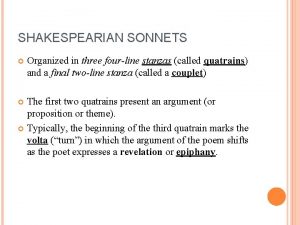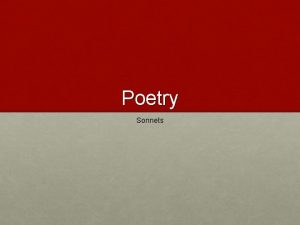Shakespearean Sonnets Most common theme of his sonnets













- Slides: 13

Shakespearean Sonnets

• Most common theme of his sonnets was love • Much debate about his sonnets; is it about himself or a fictional man? – We know who they were intended for; young man or dark lady • Sonnets express profound emotion

Sonnet Form • Formal organization and logical flow • 14 line poem that uses iambic pentameter • 3 quatrains followed by 1 couplet (Do the math: 3 x 4=12, 12+2=14) • Iambs-metrical feet (unit of measure) one unstressed syllable is followed by a stressed syllable • The rhyme scheme is abab cdcd efef gg

• On page 391, read sonnet 18 and answer the following questions on a sheet of paper. Write in complete sentences. Sonnet 18 Questions: 1. Describe a temperate climate. 2. Explain the following: line 4: summer’s lease, line 5: hot eye of heaven, line 6: gold complexion dimmed 3. How does the 9 th line provide a different view of the sonnets central theme? 4. What new idea is introduced in the couplet? 5. In the last line, what is this referring to?

Sonnet 18 Review • • • The quatrains express related ideas (metaphors) and the couplets summarize the poem There is always a turn, a shift in thought (line 9) The narrator is comparing his lover to what?

Answers 1. Describe a temperate climate. Moderate climate with distinct seasons. Cold, dry winters and hot, rainy summers 2. Explain the following: line 4: summer’s lease, line 5: hot eye of heaven, line 6: gold complexion dimmed – Summer’s duration; comparison to season’s length – The sun When behind the clouds 3. –How doesthe thesun 9 thisline provide a different view of the sonnets central theme? The first two quatrains describe how nature’s beauty fades. Line 9 begins with the transition BUT, which indicates a change in theme…. then states that the beauty of the speaker’s love will never fade.

Answers Continued 4. What new idea is introduced in the couplet? The couplet shifts focus to the poet, stating that his writing will immortalize his beloved 5. In the last line, what is this referring to? THIS is referring to the poem

Translation of Sonnet 18 Shall I compare you to a summer's day? You are more lovely and more constant: Rough winds shake the beloved buds of May And summer is far too short: At times the sun is too hot, Or often goes behind the clouds; And everything beautiful sometime will lose its beauty, By misfortune or by nature's planned out course. But your youth shall not fade, Nor will you lose the beauty that you possess; Nor will death claim you for his own, Because in my eternal verse you will live forever. So long as there are people on this earth, So long will this poem live on, making you immortal.

Sonnet 130 Questions: Conceits- an extended metaphor 1. What is unusual about the speaker's description of his On page 398, read Sonnet beloved in this sonnet? 130 and answer the 2. How does the final couplet following questions, clarify the speaker’s attitude continued on same toward his mistress? sheet of paper 3. What do you think Shakespeare’s purpose in writing this sonnet?

Sonnet Review • • • Mistress doesn’t mean the same as today’s mistress Poem about physical beauty vs. internal beauty Humorous tone

Answers 1. What is unusual about the speaker's description of his beloved in this so It doesn’t matter to the speaker that she doesn’t have superficial beauty; he loves her anyway 2. How does the final couplet clarify the speaker’s attitude toward his mist She is not idealized. The speaker describes her as having ungainly features 3. What do you think Shakespeare’s purpose in writing this sonnet? His purpose might have been to amuse readers by mocking trite conceits, or to affirm that love exists between real-not idealized-mean and women.

Translation of Sonnet 130 My mistress's eyes are nothing like the sun; Coral is far more red than her lips; If snow is white, then her breasts are a brownish gray; If hairs are like wires, hers are black and not golden. I have seen damask roses, red and white [streaked], But I do not see such colors in her cheeks; And some perfumes give more delight Than the horrid breath of my mistress. I love to hear her speak, but I know That music has a more pleasing sound. I've never seen a goddess walk; But I know that my mistress walks only on the ground. And yet I think my love as rare As any woman who has been misrepresented by ridiculous comparisons.

Write your own sonnet!! • Choose a subject…love is the most popular! • Be sure to follow the sonnet format. 3 quatrains and 1 couplet • You will share when you are finished!
 Shakespearen sonnets are organized in
Shakespearen sonnets are organized in Shakespeare sonnets introduction
Shakespeare sonnets introduction The structure of shakespearean tragedy
The structure of shakespearean tragedy Ophelia monologue o my lord
Ophelia monologue o my lord Shakespearean sonnet characteristics
Shakespearean sonnet characteristics Shakespearean comedy vs tragedy
Shakespearean comedy vs tragedy Shakespeare's tragic heroes
Shakespeare's tragic heroes Love sonnet
Love sonnet Shakespeare sonnet 1
Shakespeare sonnet 1 Who is shakespear
Who is shakespear Shakespeare language cheat sheet
Shakespeare language cheat sheet Iambic pentameter sonnet
Iambic pentameter sonnet Greek drama history
Greek drama history Characteristics of a tragedy
Characteristics of a tragedy
























